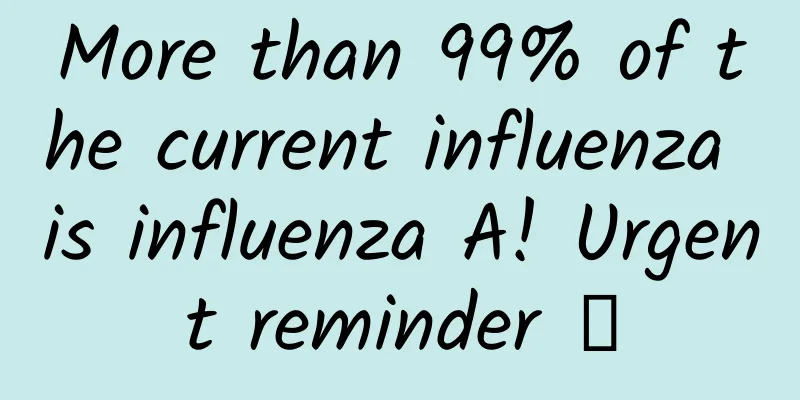More than 99% of the current influenza is influenza A! Urgent reminder →

|
Recently, influenza has been prevalent. According to the latest data from the Chinese Center for Disease Control and Prevention, the positive rate of influenza virus continues to rise, of which more than 99% are influenza A. Disease control in many places across the country urgently reminds people to take good personal protection and pay attention to preventing respiratory and intestinal infectious diseases. According to data released by the Chinese Center for Disease Control and Prevention: the positive pathogens detected in the outpatient and emergency departments of sentinel hospitals are mainly influenza viruses, human metapneumovirus, and rhinovirus; the positive pathogens detected in hospitalized severe acute respiratory infection cases are mainly influenza viruses, Mycoplasma pneumoniae, and human metapneumovirus. It can be seen that influenza is one of the most important pathogens in both outpatient and emergency cases and inpatient severe cases. If your family or friends around you also have flu-like symptoms, please forward this prevention guide to him (her) to understand influenza and follow this method to deal with it. Is the flu the same as the common cold? Flu is not a common cold! Flu has obvious seasonality. It is an acute respiratory infectious disease caused by influenza virus, and is mainly characterized by systemic symptoms such as fever, headache, weakness and muscle aches. Some high-risk groups may develop serious complications. Common cold has no obvious seasonality and is mostly caused by infections such as rhinovirus and respiratory syncytial virus. It is mainly characterized by respiratory symptoms such as nasal congestion, runny nose and sneezing, and is less likely to have complications. Please don't worry! For respiratory infectious diseases such as influenza, you can prevent them as follows: First, personal hygiene should be done well. Maintain good personal hygiene habits. Winter vacation and Spring Festival are approaching. Please take good personal hygiene protection when going out, and remember to wash your hands frequently or wipe your hands with disinfectant paper towels. If conditions permit, you can use soap or hand sanitizer to thoroughly wash your hands, correctly use the "seven-step hand washing method", avoid touching your eyes, nose and mouth; cover your mouth and nose when coughing or sneezing to prevent the spread of droplets; do not spit anywhere. In crowded places, it is recommended to wear masks scientifically. Second, it is important to strengthen your body. Do some physical exercise. Pay attention to getting enough sleep and adequate nutrition to strengthen your body and improve your resistance. Quit smoking and limit alcohol consumption to reduce the impact of bad living habits on your body. Third, vaccination is crucial. Actively vaccinate. Citizens, especially the elderly and patients with chronic underlying diseases, are advised to actively get vaccinated against COVID-19, influenza, and pneumococcal vaccines to reduce the risk of infection and severe illness. Fourth, ventilation and disinfection are a good idea. Strengthen ventilation and disinfection. When at home or in the workplace, open windows for ventilation frequently. If conditions permit, ventilate 2-3 times a day, each time for no less than 30 minutes; if there is a flu patient at home, and the secretions from the mouth and nose have clearly contaminated the surface of the object, you can choose a 500mg/L chlorine-containing disinfectant for wiping and disinfection, keep the disinfectant for 15 minutes, and then wipe it clean with clean water. Note: The configuration and use of disinfectants must strictly follow the instructions to avoid excessive disinfection! Fifth, health monitoring is essential. Pay attention to self-health monitoring. If you have symptoms of respiratory infection such as fever, cough, sore throat, etc., you should seek medical attention in time and isolate yourself to avoid infecting others. What should I do if someone with influenza appears in my home? Patients are advised to rest at home, live in a single room as much as possible, keep the room ventilated, and reduce the chance of contact with co-residents; patients need to pay attention to personal hygiene, maintain good respiratory hygiene habits, and cover their mouths and noses with tissues or towels when coughing and sneezing; closely observe the health status of patients and family members. Once the patient or other family members have persistent high fever, accompanied by severe cough, difficulty breathing, changes in consciousness, severe vomiting and diarrhea and other serious tendencies, they should seek medical attention in time; if possible, the patient should be cared for by a fixed family member who is not in the high-risk group for influenza, and a mask should be worn when in close contact with the patient. |
>>: Winter vacation is coming, and children are anxious about exams. What should you do?
Recommend
Will women who often stay up late affect pregnancy?
Many girls think that they are young and healthy ...
Polycystic ovary syndrome
Polycystic ovary syndrome is an important factor ...
Why didn't I get a reply when I sent a text message after porting my number? Is cx capital or lowercase when I send a text message after porting my number?
The process of number portability is a bit troubl...
How long does it take to do ultrasound examination during pregnancy
It is very important to have an ultrasound examin...
How long does it take to get pregnant after uterine fibroid surgery?
Uterine fibroid surgery is a surgical method for ...
A man accidentally injured his urethra while riding a bicycle. What should he do?
Author: Tang Qin, Researcher of Chinese Medical A...
After the menstrual period is over, it is the safe period
Most people who have regular sex will calculate t...
How can women nourish the kidneys?
Don't just think that men can nourish the kid...
Why are the leaves of the mage not in the right color? How to water the mage if the color is not right?
The Crassulaceae family is a collective name for ...
How to shrink your belly after a cesarean section
After ten months of pregnancy, women are particul...
What is the use of Tai Chi? Is Tai Chi good for health?
Tai Chi is a martial arts sport that conforms to ...
What causes green vaginal discharge in late pregnancy?
Women during pregnancy are also prone to gynecolo...
Will I still have milk during pregnancy?
Many new mothers think that it is impossible to g...
A brief discussion on candidal vaginitis during pregnancy
You may still be unfamiliar with candidal vaginit...
Is baking soda effective for vaginal yeast infection?
Many people who have candidal vaginitis will choo...









